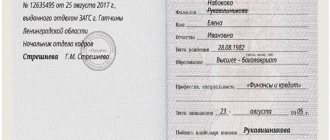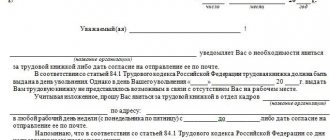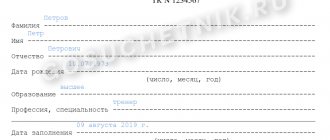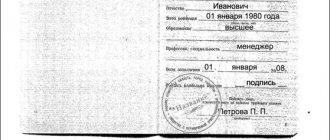Labor Code to help
In order to dismiss an employee in full compliance with the law, among other procedures, it is necessary to make a correct entry in his personal work book. However, you do not need to figure out on your own how to formulate this or that reason for dismissal; you should remember that the wording for all possible reasons for this is clearly stated in the Labor Code of the Russian Federation. When making an entry, you must indicate the number of the article, part, and also paragraph of the Federal Law - this is exactly the norm established in the article
.
3rd block. "Loss of trust"
- loss of trust by the employer in the employee.
Such loss may be caused by the following:
- loss of trust due to the commission of negative actions by an employee responsible for monetary or commodity values. The most common type is when an employee is accused of embezzlement;
- failure to resolve conflicts of interest between the employee and the employer’s organization. Failure to prevent a conflict of interests of the employer's organization with another legal or individual person having a direct or indirect relationship (interest) in the employee;
- failure to provide or provision of incomplete (unreliable) information about income, expenses, property and property obligations of oneself and one’s spouse, minor children in cases established by law;
- storage of cash and valuables in foreign banks located outside the territory of the Russian Federation, possession and (or) use of foreign financial instruments by an employee, his spouse and minor children in cases provided for by this Code, other federal laws, regulations The President of the Russian Federation and the Government of the Russian Federation, if these actions give rise to a loss of confidence in the employee on the part of the employer.
4th block “Circumstances not related to the actions of the employee”
- liquidation of the organization. This is the most peremptory basis for dismissal. Dismissal on this basis is possible even if the employee is on vacation or sick (part 6 of Article 81 of the Labor Code of the Russian Federation)
- reduction of staff or number of employees;
- change of owner of the organization’s property (in relation to the head of the organization, his deputies and the chief accountant);
- termination of an employment contract with the head of the organization, as well as with members of the collegial executive body of the organization on the grounds directly stipulated in the employment contract with such persons;
Important!
It is impossible to dismiss an employee who is on vacation or on sick leave (during a period of temporary incapacity) at the initiative of the employer. The exception, as we have already written, is the liquidation of an organization.
Why do you need a work book and what information does it contain?
Before starting a more detailed conversation about records for reasons for dismissal, let’s consider why a work book is needed in the first place. As the law explains, a work book is an important document that allows you to calculate your total work experience, for example, for calculating a pension; contains information about education, and also informs employers about the merits of the new employee in previous places of work and the reasons for dismissal from there. The following must also be included in the work book:
- dates and reasons for the employee’s transfer from one position to another;
- information about hiring and dismissal;
- information about obtaining additional professions;
- messages about completed advanced training and retraining courses;
- part-time data;
- information about awards and achievements, etc.
If an employee has changed his last name or his name has changed while working for the company, this must also be noted in the work book.
At the same time, experts do not recommend making entries in the work book with details of penalties. Rare exceptions are those situations where a gross violation of some rules served as the basis for dismissal from office.
Now let’s take a closer look at the most common reasons for dismissals and the rules for entering information about this into the work book.
Filling out work books in 2021
The rules for filling out a work book in 2021 remain the same, despite a package of changes to maintaining documentation in connection with the pension reform and a number of other transformations. The only change is the ability to certify records only with the signatures of responsible persons without the organization’s seal. At the same time, the legality and reliability of the data will not be questioned.
Responsibility for maintaining also falls on the employees and the head of the HR department of the enterprise. An exception may be those cases when the company does not have a human resources department; in this case, the data is added by the organization’s accountant signed by the manager.
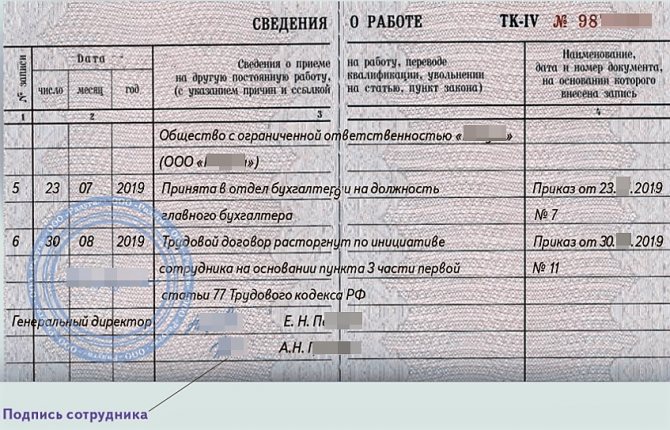
Please note that correctly filling out the document is the most important factor when working with personnel. First of all, the presence of errors or lack of appropriate marks during inspection by regulatory authorities may cause the introduction of a number of restrictions on the company’s activities. In addition, errors or lack of information can become an obstacle for an employee in correctly calculating pensions, and in this case, you will have to contact the organization, pull up archival acts on acceptance and dismissal from the place of work.
Thus, managers and employees of human resources departments are recommended to familiarize themselves with the documentation standards and continue to adhere to them, tracking current changes.
Caring on your own - how to reflect it in your labor report
Oddly enough, it is precisely leaving work on a person’s personal initiative that most often raises doubts among novice personnel officers: what to refer to, what entry to make in the employment record in this case? Due to the fact that the Labor Code contains several articles suitable for this situation, there are several options:
- first option: rely on . Then you should write something like the following: “In accordance with clause 3, part 1, art. 77 of the Labor Code of the Russian Federation, the employment contract was terminated at the initiative of the employee.” This recording is not satisfactory;
- can be formulated a little differently: “In accordance with clause 3, part 1. Art. 77 of the Labor Code of the Russian Federation, dismissed at his own request.” This possibility is indicated in
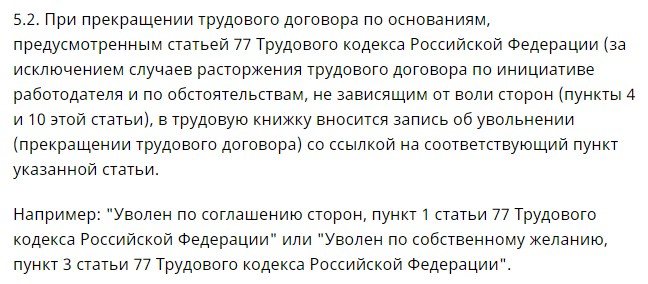
(The instructions were specially developed and approved by the Russian Ministry of Labor).
In cases where an employee leaves a position on his own initiative due to reasons that allow him to receive some benefits, subsidies and other advantages, the personnel specialist must clearly indicate these reasons.
Among others, this may include child care if necessary until the age of 14, a certificate of transfer of a spouse to work in other regions, etc. If you have any questions regarding this point, you can read the article in more detail.
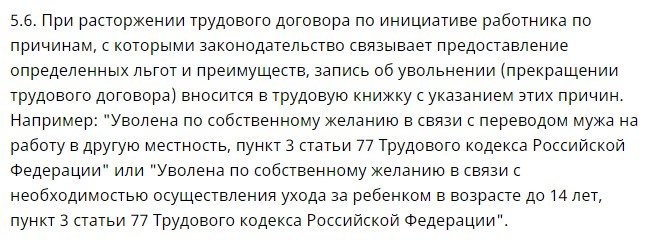
– a detailed explanation is given there.
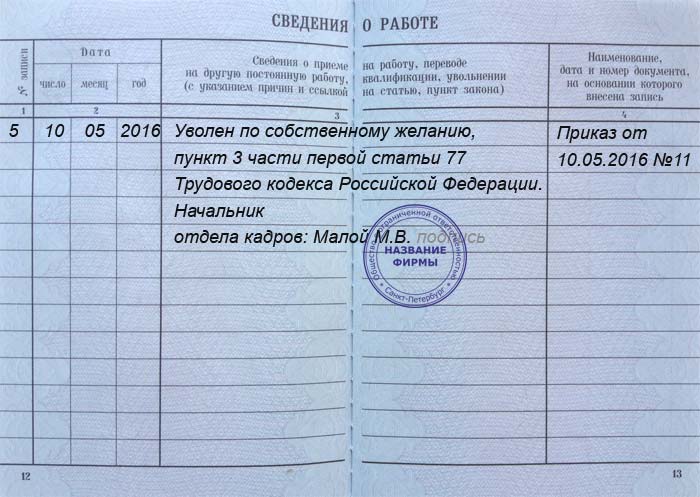
Regardless of the reason that served as the basis for parting with work at one’s own request, after entering this fact into the work book, it is necessary to put the signature of the personnel officer, the signature of the employee with the inscription “acquainted”, as well as the seal of the enterprise.
Restrictions on dismissal at the initiative of the employer
It should be noted that labor legislation establishes a number of additional restrictions for the dismissal of certain categories of workers.
However, looking ahead, we will say that these restrictions do not apply to cases of dismissal on the “negative” grounds listed above in blocks 1-3 and dismissal during the liquidation of the company.
Categories of employees with special status upon dismissal:
Workers with children
An employer cannot unilaterally fire:
- a woman with a child under three years of age;
- single mother with a child under 14 years of age (disabled child under 18 years of age);
- persons raising a child under 14 years of age (disabled child under 18 years of age) without a mother;
- a parent (legal representative of the child) who is the sole breadwinner of a child under 3 years of age in a family raising three or more children under 14 years of age, if the other parent (other legal representative) does not work;
- a parent (other legal representative of the child) who is the sole breadwinner of a disabled child under 18 years of age, if the other parent (other legal representative) does not work.
Pregnant women
Pregnant women are a special category of employees whose dismissal at the initiative of the employer is impossible on legal grounds, with the exception of situations related to dismissal during the liquidation of the company.
In addition, an employer cannot fire a pregnant woman even at the end of a fixed-term employment contract. A pregnant woman should be provided with similar positions with an employer (Article 261 of the Labor Code of the Russian Federation).
Important!
The employer may not know about the employee’s pregnancy, and if this fact is established after dismissal, then such dismissal of a pregnant woman at the initiative of the employer will be considered illegal.
The employer's actions related to the dismissal of a pregnant woman will be recognized as illegal and the employee will have to be reinstated at work, even if by the time the unlawful dismissal was filed, the pregnancy had ceased (the birth of a child or termination of pregnancy due to other circumstances).
Minor workers
It is impossible to dismiss employees under the age of 18 at the initiative of the employer (except in cases of liquidation) without the appropriate approval. Consent to dismiss such an employee must be obtained from the labor inspectorate.
Union members
An employer cannot dismiss an employee who is a member of a trade union without taking into account the reasoned opinion of the trade union.
A special procedure - approval of a higher trade union body, is assigned to the employer in relation to the head (his deputies) of elected collegial bodies of trade unions (including trade unions of structural divisions of the organization).
Team representative
The dismissal of employee representatives participating in collective bargaining (except for cases of dismissal for disciplinary violations) or in resolving a collective labor dispute may also be considered illegal.
Consent to dismiss such an employee will need to be obtained from the association (team, division) of workers that nominated the authorized person.
What to write in the labor report if an employee is transferred
As the main personnel document regulating the relationship between employer and employees states, in cases where an employee is transferred from one place of work to another, the basis for the transfer plays an important role. A transferred person can be:
- of one's own free will;
- by order of management, but only with consent.
The specialist at the former place of work must indicate one of these two points, while the personnel officer from the new job no longer needs to write about the reasons for the transfer. It is enough to confine yourself to a brief note that the employee was hired for such and such a position as a transfer.
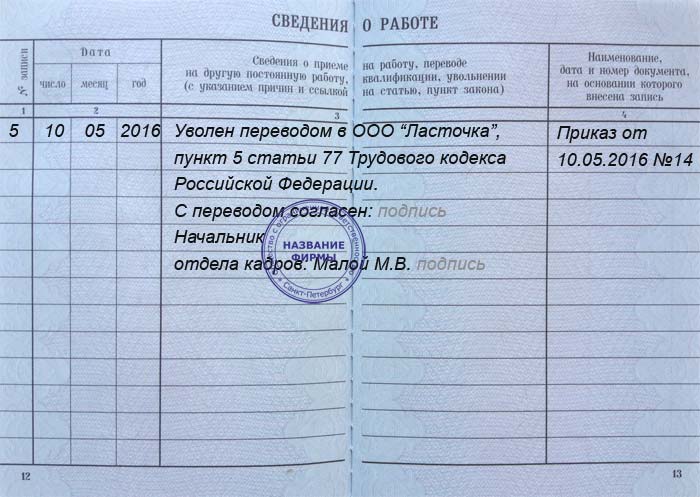
Important! When making any records of dismissal in work books, you must strictly follow the letter of the law and avoid mistakes. Quite often, HR department specialists, when recording information about dismissal, refer to Article 80 of the Russian Labor Code. But you need to remember that this article does not serve as a basis for dismissal. It only regulates the termination of a previously concluded employment contract between the organization and the employee. If a personnel specialist from a new job discovers this error in an employee’s work record, he will ask the person who made it to correct it. Thus, a small mistake can lead to unnecessary troubles and worries.
How to fill out work forms correctly?
When filling out a work form for the first time, the procedure is as follows:
- Entering information on the title page - including primary data about the employee, with verification against data from the passport and a document confirming the level of education.
- The next important step is to enter information into the work records section.
- The next step is to make a record recording the fact that the person has officially started working.
The section must be completed every time a person officially changes his place of professional activity.
First, write the exact and full name of the institution. Some organizations put a special stamp with the name, and you don’t need to write anything by hand.
Column 1 “Record number” contains the numbering of all records.
Column 2 – “Date”. There they must put in numbers the exact date of taking up the job, and the number should not have any disagreement with the employment contract.
Column 3 is the longest. Here you need to carefully enter what specific position the person will be assigned to.
Column 4 contains the basis for hiring - these are orders issued by the manager. First they write the name, and then its number, and the exact date in numbers.
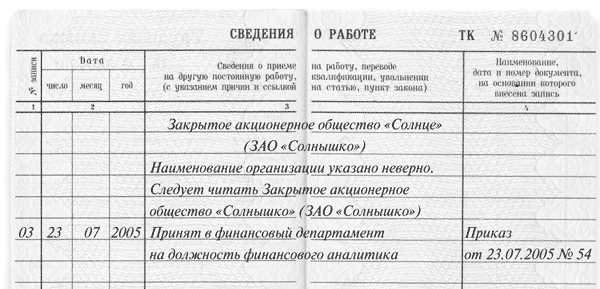
In exactly the same way, information is entered regarding the transfer of an employee to another position, or to another department of one institution.
The section with information about incentives is filled out in the same way:
- first - the number under which the entry is made, in numbers - the actual date of the promotion;
- type of incentive actions - for example, gratitude, who issued it and the motive;
- document justifying the incentive - orders, resolutions.
Dismissal by agreement of the parties
Sometimes, in order to finally part with an unlucky employee, employers resort to a rather neutral note with the wording: “Dismissed by agreement of the parties.” In this case, it is necessary to refer to
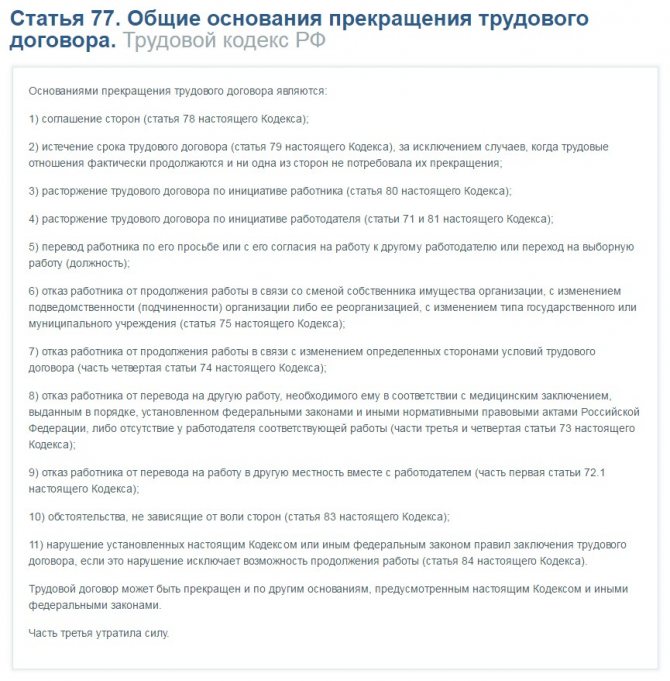
. It must be said that the Labor Code does not provide for any strict requirements for this kind of dismissals, but it is worth remembering that an agreement is possible only with the mutual voluntary consent of the parties.
In addition, in this case, the employee has the right to so-called “compensation” or, more simply, monetary compensation.
Retirement: correct entry in the work book
Sooner or later, all people leave their workplace due to retirement. Therefore, every personnel officer must know exactly how to make an entry in the labor record in these cases.
To begin with, it should be said that the dismissal of an employee in connection with an upcoming pension is possible only when a certain age is reached and only on the basis of his voluntary desire.
After the employee declares his will in writing and the management of the enterprise signs the order of dismissal from his position in connection with reaching retirement age, an entry can be made in the work book.
In case of dismissal upon retirement, you need to rely on the article. An employee, like a HR specialist, must put a personal autograph on the entry, and then it must be certified with the company’s seal.
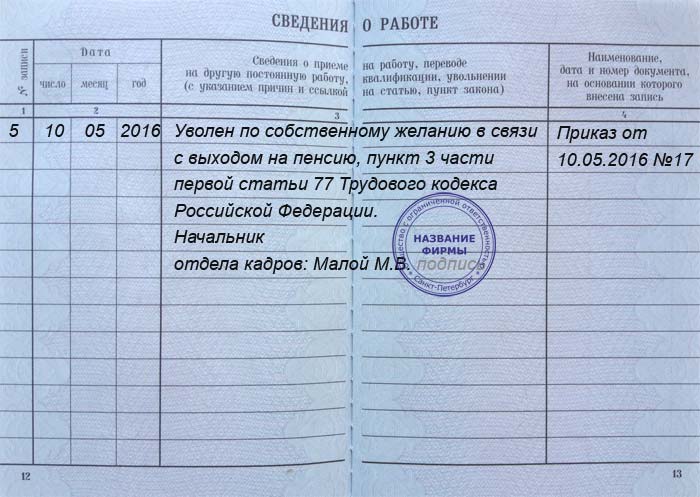
Design rules
There are several options for registering a work report upon dismissal; all of them are purely individual and depend not only on the reason, but sometimes also on the personal circumstances of the case. So, filling occurs as follows:
- The first column is the number of the record that will be executed. It should be just a number, for example - 45.
- In the second, you should indicate the date when the entry is made; in this case, the date of dismissal will be considered the last day of work of the employee or the day the order was issued.
- In the third column you should enter the information about the dismissal. This section will differ for different reasons for reduction. This is where the reason and additional information for clarification, if any, will be indicated.
- In the last column, you should indicate the order for the dismissal of this employee, its number and date of issue.
You can learn how to correctly make entries in a document from the following video:
At your own request
If the subject resigns at his own request, and the employer does not have any claims against him, the third line should say “the dismissal occurred at his own request.”
Please note that if the dismissal occurs according to some benefits or special conditions, this should also be indicated. So, for example, there is an entry “... in connection with the transfer of the husband to another area.”
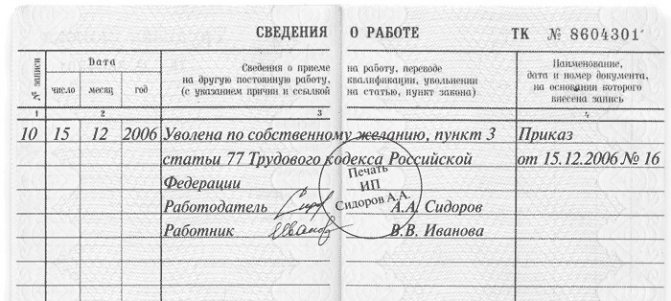
By agreement of the parties
There are often cases when an employee is fired by agreement of the parties. In this case, all previous rules remain in force, except for the third paragraph.
In the “information on termination of employment relationship” column, it is worth entering the agreement between the employer and employee, as well as the corresponding article, as the reason. In this case, the entry will contain the phrase “by agreement of the parties” and refer to paragraph 1 of Art. 77 Labor Code of the Russian Federation.
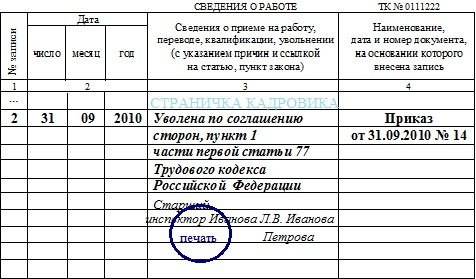
In connection with the liquidation of a branch or enterprise
Since the liquidation of an enterprise occurs due to the decision of the owner, the initiative in dismissal must be at his will.
In this case, the employee must enter the following information in the book: “at the initiative of the employer in connection with the liquidation of the enterprise, clause 1 of Art. 81 Labor Code of the Russian Federation.” The reason may also be indicated - the termination of the existence of an individual entrepreneur.
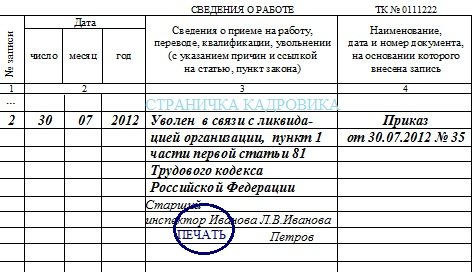
Due to the death of an employee
If an employee dies, this is not a reason to throw out his employment record. It must be filled out and then given to relatives. This can be done in two ways: by hand against a signature or by mail after a written application from one of the relatives.
All items are filled out in the same way as the previous ones, but in the third column the following data must be entered “in connection with the death of an employee, clause 6 of Art. 83 Labor Code of the Russian Federation.”
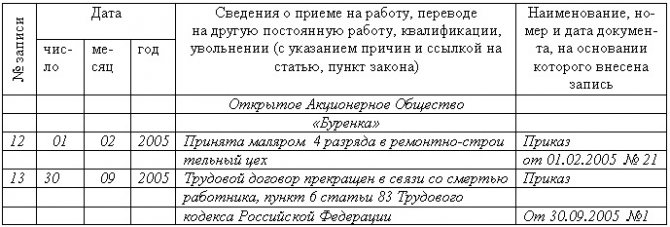
When reducing staff or position
In this case, the following wording would be appropriate: “due to a reduction in the number of employees,” reference to clause 2 of Art. 81 Labor Code of the Russian Federation.
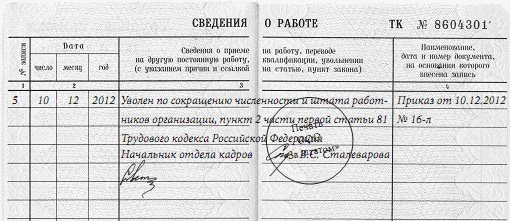
If you refuse the transfer
There are situations when, for health reasons, a person must be transferred to another position, job, or to another location. But he may refuse to do this - this may be the family’s reluctance to move, poor working conditions, low wages, etc.
Then the subject can try to talk with his superiors and find a compromise or write a letter of resignation. In this case, he will be dismissed due to refusal to transfer. The entry in the employment record must be appropriate: “with refusal to transfer to a new place of work,” reference to Art. 77 clause 8 of the Labor Code of the Russian Federation.
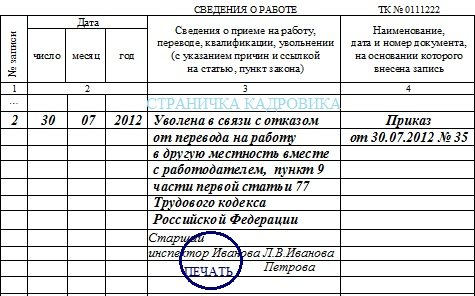
There are many more reasons for dismissing staff, in each of them it must be recorded in the work book. Check the information and demand that management comply with all laws of the Labor Code of the Russian Federation.
Other grounds for dismissal
As the Labor Code of the Russian Federation states, there are three most common types of grounds for separation from an employee: at the request of the employer, general, and due to circumstances beyond the will of the parties.
But, in addition to these grounds for dismissal, there are several additional ones. These include:
- declaring the enterprise bankrupt;
- making a decision by a legal entity to terminate an employment contract.
In these unpleasant cases, the work book must refer to the article
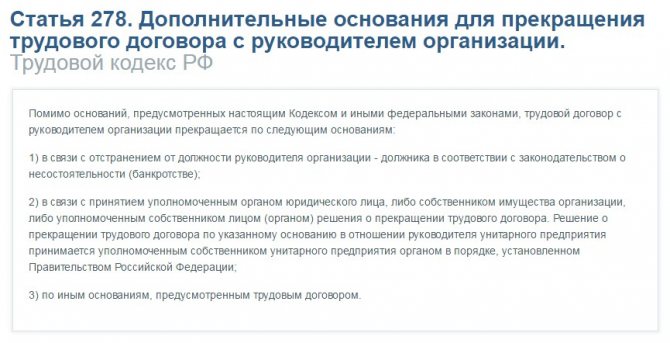
, and not on , and introduce formulations that correspond specifically to it.
Thus, before writing to the employment record of an employee about dismissal, it is advisable to check the Labor Code. All possible reasons for dismissal are indicated in it in different articles and described in detail. In order to save yourself and the person being fired from possible problems in the future, it is necessary to avoid mistakes and refer specifically to those articles that correspond to certain circumstances for parting with a former employee.
